Gaerne G.Air Carbon - footwear of choice for Cadel Evans
Gaerne's top-end G.Air
Carbon shoe
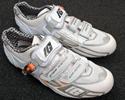
|
|
The grippy heel pad
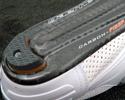
|
|
The interior of the
rear of the shoe
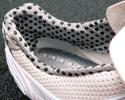
|
|
A high-quality aluminum
buckle
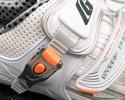
|
|
Italy-based cycling footwear maker Gaerne occasionally gets caught
in the shadow of some of its more prominent compatriots, but it
boasts a 40-year history as well as a storied reputation easily
on par with the best in the business. Its top-end G.Air Carbon is
also the shoe of choice for Predictor-Lotto rider Cadel Evans, who
likely favors it for its rigid full-length carbon sole and dizzying
array of footholding accoutrements.
The well-ventilated Lorica and nylon mesh uppers are augmented
by Gaerne's Power Control System, which surrounds the ankle area
with a sturdy external heel counter and a fairly rigid polyurethane
'cage' secured by a ratcheting aluminum buckle. The two forefoot
Velcro straps include the clever Safety Lock Strap System, consisting
of a pair of toothed plates per strap that lock on to each other
when the straps are pulled tight, while the back half of the shoe's
interior is also dotted with sock-gripping appliqués. Rider comfort
is promoted by the densely padded (but suitably thin) tongue, as
well as a moveable instep pad, dubbed by Gaerne as the Adjustable
Instep Closure System.
This army of features certainly locks in securely, and there is
virtually no chance that any of the straps will loosen up even during
the most violent of sprints. Likewise, the polyurethane cage does
live up to its billing by stabilizing the rear of the foot, thus
preventing it from moving around too much either laterally or in
rotation. In addition, Gaerne's EPS Carbon outsole is quite possibly
one of the most rigid we've tested in recent memory and power transfer
is simply a total non-issue. If your goal is to go, these things
can definitely handle it.
Unfortunately, though, the G.Air Carbon isn't quite as comfortable
as it is secure. While the Power Control System is undoubtedly stout,
its geometry tends to pull the top of your foot down into
the shoe, as opposed to back into the heel. Moreover, the adjustable
instep 'pad' doesn't really have much in the way of actual padding
and is rather flat. Thankfully, the sides of the uppers curl up
quite far around the top of the foot so this is ameliorated somewhat.
Still, though, our insteps tended to ache occasionally on longer
rides and we still experienced a bit more heel lift than we expected
(although to be fair, it didn't present an issue while on the bike).
The fit of the G.Air Carbon is decidedly Euro, with a fairly narrow
toe box that doesn't leave much room for wide-footed riders or custom
insoles or inserts. We also found the G.Air Carbon to run a hair
large in terms of sizing; while we would normally have used a sz43.5
or 44, the sz43 ended up fitting us best. Neither of these are faults
per se, but both definitely warrant a definite trial fit before
purchase.
Overall, the G.Air Carbon shoes delivered superb security, a ridiculously
rigid and efficient carbon sole, top-notch materials, and excellent
construction quality. More casual long-distance riders might look
towards something a little less aggressive, but if a solid hold
and excellent power transfer rank at the top of your list (and if
your feet aren't too wide), the Gaerne G.Air Carbon is worth a look.
/JH
Weight: 710g (1.57lb) per pair (sz43)
Price: US$309.99
Pros: Uber-rigid carbon sole, ultra-secure strap system,
excellent construction quality, comprehensive size range (sz37-49,
with half sizes available from 41-45)
Cons: Instep pad could use more actual padding, Power Control
System would be more comfortable with altered geometry, relatively
narrow toebox, could be lighter
Cyclingnews rating: 
More info: www.gaerneusa.com
PhotographyFor a thumbnail gallery of these images, click here
Images by
James Huang/Cyclingnews.com

Cateye Strada Wireless - little, yet big
The new Cateye Strada
line of computers
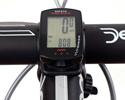
|
|
The wireless sensor
is easy to install
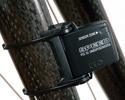
|
|
The innovative ClickTec
interface
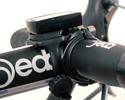
|
|
Cateye's latest computer line, the Strada, boasts one of the smallest
form factors to date but also wears one of its biggest displays
thanks to its clever design. The main display is a whopping 14mm
tall, which makes checking your speed a mere glance rather than
a squint, while the secondary readout displays all of the unit's
other functions and is still a very-legible 7mm tall. Each member
of the line (which includes the standard Strada wired version, the
Strada Wireless, and the Strada Cadence) shares similar dimensions
with the head itself measuring just 46mm long and 30mm wide. As-installed
weight of our entire Strada Wireless test setup is a paltry 46g.
The elegant design is definitely attractive, something that many
people commented on when asked if they liked the unit. The clean
look eliminates conventional buttons in favor of Cateye's ClickTec
system, which effectively turns the screen itself into a button
and maximizes real estate for the screen.
But how I hear you ask? Cateye designed the computer mount such
that it acts as a cam or rocker, such that when the user pushes
down on the screen, it pivots from the front and compresses a small
rubber button on the unit's underside. The design works surprisingly
well although it does require a slightly harder push than is usually
required on a conventional interface.
Installation is a breeze thanks to the new tool-free FlexTight
mount, which can be mounted on either the handlebar or the stem
for that truly 'euro' look. The versatile design will work for most
stems or bars, but if you have an odd shape handlebar and don't
want to run the unit on your stem, it would be best to check first
before purchasing. The sensor is similarly easy to mount with the
included zip-ties, but like the head unit mount, it may be best
to check first if your fork has oddly shaped blades.
All the normal functions such as speed, distance and various timers
are included, and Cateye also incorporates an auto start/stop feature,
auto power-saving mode, programmable odometer, pace arrow, and dual
wheel size capability into the unit. One feature that is particularly
useful is the secondary trip distance, great for measuring a weeks
worth of training. One notable omission, but one that is admittedly
hardly necessary, is a backlit screen that only users who spend
a lot of time riding in the dark will miss it (Cateye does include
one on its Micro model, though).
Overall the Strada Wireless is a superb unit. It includes a comprehensive
feature set, looks great, is easy to read and use, super light,
and even a breeze to install as well. /PV
Price: US$60
Weight: 46g (complete assembly, including head, sensor, wheel
magnet, and all associated mounts and hardware)
Pros: highly legible, small footprint, easy to install, mounts
on both handlebar and stem, typical Cateye reliability
Cons: ClickTec interface requires a bit more force than usual,
no back light
Cyclingnews rating: 
More info: www.cateye.com
PhotographyFor a thumbnail gallery of these images, click here
Images by
James Huang/Cyclingnews.com

Prendas / Santini Faemino jerseys
The complete ensemble

|
|
A short zipper
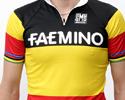
|
|
The sleeves are just
the right
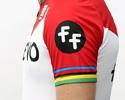
|
|
The cotton cap is great
for riding,
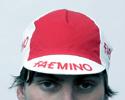
|
|
UK cycle clothing retailer Prendas has reproduced one of the most
famous jerseys from the 1970's. Originally made in wool and worn
by arguably the greatest cyclist ever, Eddy Merckx, this series
of Faemino jerseys comes in two colour schemes.
As a tribute to the grand master himself, the original team jersey
features the world championships stripes on the sleeves and neck,
which Merckx earned in 1967 in Heelen, The Netherlands. The other
option flies the colours of the Belgian national champion, a race
he won only once in his career, in 1970. This is the jersey that
Merckx wore at the start of the 1970 Tour de France, before trading
it for the yellow jersey as he claimed his second of five victories
in the event.
These classic reproductions are made in Italy by Santini, but unlike
the original, they are not made from wool. Santini swaps the natural
fiber for its own high-grade and lightweight 'Play' fabric - which
contains a polyamide (nylon) on the inside for breathability and
comfort and polyester on the outside. The quality of the stitching
is as expected from an Italian clothing manufacturer, i.e. second
to none.
The fit of the jersey is also what you would expect from an Italian
manufacturer, tight and snug but without restricting movement. During
rides in warmer weather the jersey proved to be cool as well as
comfortable. A short 14cm zipper is provided, but a full length
version would have been appreciated for a little more ventilation
flexibility. Quite understandably, though, Prendas opted against
this in keeping with the retro theme of things (pros in the 1970's
never had the luxury of a full length zip), as one minor gripe back
in the day was that the old metal versions often got stuck and took
a few goes to either zip up or down.
The jerseys come with three rear pockets to keep your spare tubes,
bananas, iPods, or mobiles secure and handy and they performed their
function as would be expected.
Also supplied was a matching cotton cap and musette. The cap is
handy if you want to keep your hair and/or the sun out of your eyes,
or just prefer one under your lid. Considering its ubiquitous nature,
the musette is not really handy for much unless you plan on using
it as a race feed bag. Again, these items are meant more as a tribute
to the old days than purely functional contemporary bits so keep
that in mind.
Overall, the jerseys are comfortable and of high quality, perfect
for summer riding or just posing at the cafe. If you are into the
retro look (or remember that era like it was yesterday) and no issues
wearing a jersey that displays the stripes of a previous world championship
winner or those of the Belgian champion, then these jerseys are
for you. For the rest of you, probably best to look elsewhere for
your summer cycling needs. /PV
Price: £39.95 (Faemino Jersey (Belgium Champion or Team)
- Short Sleeve); £6.00 (Faemino team musette); £6.00 (Faemino cotton
cap)
Pros: Good quality jersey perfect for the warmer months,
looks cool
Cons: short zipper, the retro look and those championship
colours aren't for everyone
Cyclingnews rating: 
More info: www.prendas.co.uk
PhotographyFor a thumbnail gallery of these images, click here
Images by
Paul Henderson-Kelly/Cyclingnews.com

|













